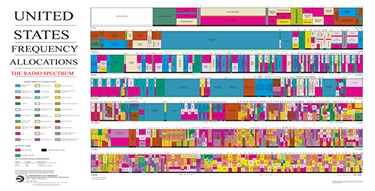NSF Awards $12 Million For Radio Spectrum And Wireless Technology Research
By Jof Enriquez,
Follow me on Twitter @jofenriq

The National Science Foundation (NSF) continues to support projects to promote efficient radio spectrum sharing and new wireless technologies, with its latest funding awards amounting to $12 million going to 11 principal investigators and projects. The grant allocation brings NSF's total investment in this area beyond $60 million for 140 projects over the past five years.
Increasing mobile data and wireless broadband use traffic have made radio spectrum access more difficult to manage. NSF, along with the Federal Communications Commission (FCC), Defense Advanced Research Projects Agency (DARPA), and other agencies are implementing different programs to avert a looming spectrum crisis.
In July, NSF announced that it will invest more than $400M over the next seven years to support fundamental wireless research and to develop platforms for advanced wireless research in support of the White House's Advanced Wireless Research Initiative.
NSF, in a series of workshops under its Enhancing Wireless Access to the Radio Spectrum (EARS) program, previously identified key challenges in ensuring ample availability of spectrum resources, and formulated a list of recommendations — including several cutting-edge research areas combining the fields of the physical sciences, engineering, computer and information sciences, mathematics, economics, and public policy.
"The radio frequency spectrum is a finite but exceedingly valuable natural resource that facilitates a variety of applications and services. The research activities supported by these awards represent bold new approaches with the potential to contribute to improvements in the efficiency of radio spectrum utilization while protecting passive sensing services, and allowing traditionally underserved Americans to benefit from current and future wireless-enabled goods and services," said Jim Kurose, head of NSF's Computer and Information Science and Engineering Directorate, in a news release. Together with NSF's Engineering and Math and Physical Sciences Directorates, Kurose’s supported the awards, which focus on the four following areas:
- Innovative radio hardware and access architectures to enable spectrum sharing
- Harmonious co-existence of heterogeneous wireless technologies
- Development of automated detection mechanisms and compliance certification methods
- Spectrum access for science services
The three-year awards will be given to 11 projects and investigator teams.
- Automated Enforcement in Spectrum Sharing: Technical Challenges and Policy Considerations — Martin Weiss, University of Pittsburgh; Jung-Min Park, Virginia Tech.
- Overcoming Propagation Challenges at Millimeter-Wave Frequencies via Reconfigurable Antennas — Hani Mehrpouyan, Boise State University; Hamid Jafarkhani, University of California, Irvine; Vida Vakilian, California State University, Bakersfield; Nader Behdad, University of Wisconsin-Madison.
- Mitigating Ultra-Faint RFI to Enable Radio Cosmology — Miguel Morales, University of Washington.
- Real-time Control of Dense, Mobile, Millimeter Wave Networks Using a Programmable Architecture — Nicolo Michelusi, Purdue University; Alexander Sprintson, Texas A&M University; Christopher Anderson, United States Naval Academy.
- Toward Harmonious Coexistence of Heterogeneous Wireless Services — Jeffrey Reed, Virginia Tech.
- Energy- and Cost-Efficient Spectrum Utilization with Full-Duplex mm-wave Massive MIMO — Borivoje Nikolic, University of California, Berkeley.
- Terabit-per-second Scale Networking: Design to Field Trials, Lab to Tower — Edward Knightly, Rice University.
- Blind Source Separation with Integrated Photonics — Paul Prucnal, Princeton University; Shuangqing Wei, Louisiana State University.
- Cloud-based Oblivious Spectrum Mapping and Allocation — John Shea, University of Florida.
- SpecSense: Bringing Spectrum Sensing to the Masses — Samir Das, Stony Brook University.
- Enabling Opportunistic Environmental Monitoring with Non-Uniform Sampling and Processing Circuits — Mike Shuo-Wei Chen, University of Southern California.
